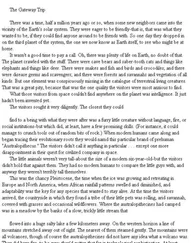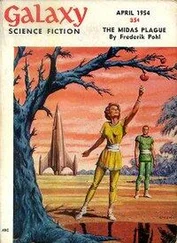Pohl, Frederik - The Age of the Pussyfoot
Здесь есть возможность читать онлайн «Pohl, Frederik - The Age of the Pussyfoot» весь текст электронной книги совершенно бесплатно (целиком полную версию без сокращений). В некоторых случаях можно слушать аудио, скачать через торрент в формате fb2 и присутствует краткое содержание. Жанр: Старинная литература, на английском языке. Описание произведения, (предисловие) а так же отзывы посетителей доступны на портале библиотеки ЛибКат.
- Название:The Age of the Pussyfoot
- Автор:
- Жанр:
- Год:неизвестен
- ISBN:нет данных
- Рейтинг книги:4 / 5. Голосов: 1
-
Избранное:Добавить в избранное
- Отзывы:
-
Ваша оценка:
- 80
- 1
- 2
- 3
- 4
- 5
The Age of the Pussyfoot: краткое содержание, описание и аннотация
Предлагаем к чтению аннотацию, описание, краткое содержание или предисловие (зависит от того, что написал сам автор книги «The Age of the Pussyfoot»). Если вы не нашли необходимую информацию о книге — напишите в комментариях, мы постараемся отыскать её.
The Age of the Pussyfoot — читать онлайн бесплатно полную книгу (весь текст) целиком
Ниже представлен текст книги, разбитый по страницам. Система сохранения места последней прочитанной страницы, позволяет с удобством читать онлайн бесплатно книгу «The Age of the Pussyfoot», без необходимости каждый раз заново искать на чём Вы остановились. Поставьте закладку, и сможете в любой момент перейти на страницу, на которой закончили чтение.
Интервал:
Закладка:
But not now. It was gone now. All gone, except for a few tens of thousands left in the account at the Nineteenth Chromatic, plus what the Sirian paid to his account every day. It was about enough to pay his standard joymaker fees for a couple of weeks, maybe. If he was careful.
But Forrester was resigned to the situation. He didn’t mind it particularly—at least, he didn’t mind his bankruptcy, since it lay within his power to work and make more money than he had ever dreamed of anyway. What he minded very much was the fact that he had been a joke—he and his quarter of a million dollars. And he minded most of all the fact that Adne had shared in that joke.
Because dimly, like a faint, predawn glow in the desert, he could see the foretaste of a time when Ande could be very important to him.
Was already very important to him, he thought wryly. At least in a potential sort of way. He wondered again what she had meant about that business of choosing a name . . . and why, he suddenly thought, had she not called him?
But what was important to him, Forrester realized, was not necessarily important to anyone else. For now, he was a sort of apprentice to life. For now, he would wait, and work, and learn. For now he would not push his luck.
Forrester had learned modesty, if he had learned nothing else.
Forrester had not yet discovered that, in one particular and quite unpleasant way, he was on his way to becoming the most important man in the world.
What mostly confused Forrester about his Sirian employer was that the creature seemed preoccupied. Forrester even asked his joymaker about it.
“Can you clarify your question, Man Forrester? What is there about the behavior of Alphard Four Zero-zero Trimate that puzzles you?”
“Just call him ‘the Sirian,’ will you? Anyway, he has a funny way of talking.”
“Perhaps that lies in my computation, Man Forrester. The Sirian language is tenseless and quasi-Boolean. I have taken the liberty of translating it into approximately twentieth-century English modes of speech, but if you wish I can give you a more literal rendering or—”
“No, it’s not that. He seems to have something on his mind.”
There was a pause of a second or two. Even Forrester knew enough to remark this occurrence; for the computer facilities to hesitate or search for an answer meant that the problem was something remarkable. But all the joymaker said was, “Can you give me an instance, Man Forrester?”
“Not really. Well, he has me doing some odd things. Is it right for him to want to hypnotize me?”
A pause again. Then the joymaker said, “I cannot say, Man Forrester. But I advise you to be cautious.”
Well, cautious he was, Forrester reflected. But he was also puzzled.
The Sirian did not repeat its suggestion about hypnotizing Forrester—“to secure in-depth referents, plus buried traumas of former time”—but it remained hard to figure out. It capriciously had him talking about the twentieth century at one moment, explaining the Arian-Athanasian wars of nearly two millennia before that at another. (Forrester had had to beg time out to research the heresies revolving around the distinction between the words “homoousian” and “homoiousian”; even so, he never really did get the problem straight.) It kindly volunteered to assume his joymaker costs as part of his expenses. It refused to allow him to charge as travel expenses a trip to the deepest vaults of Shoggo, where he had been looking up records of the abandoned pressure-dome settlements on Saturn. “Capricious” was the word.
It occurred to Forrester that the Sirian might simply be lonesome. But it rejected his offer to come visit it in its quarters. And, as far as he was able to tell, it showed no interest in the fate of its ten compatriots also in exile on Earth.
“You explain common-law marriage.” And, gamely, Forrester tried to describe to a Sirian the drives of sexual impulse and family needs, which had brought about a formal institution to regularize irregular conduct. “There exist trading stamps!” boomed the hollow, empty voice; and Forrester did his best to clarify the complexities of retail supermarket sales. “You have or have not violated legislative compulsion programs,” stated the Sirian; and that was the most prolonged session of all. Try as he would, Forrester could not seem to get across the idea of a personal ethic—of laws that one did not violate, because they were morally right, and of laws that everyone violated if they possibly could, because they were morally irrelevant.
He found himself feeling sorry for the Sirian. Its homework was even more arduous than his own.
But Forrester’s homework could not be neglected. He ordered his joymaker to display the records of the long-range reconnaissance of the Sirian planet.
He had been thinking of the Sirians as a paper tiger, but now he saw fangs. Englobed by fortresses, with fast and mighty vessels of war flitting about like wasps, the whole Sirian system was a vast network of armament. There were a dozen planets in all, two of them in Trojan orbit with Sirius B, the rest normal satellites of the great white star. All were inhabited. All were defended.
Earth’s reconnaissance drones had been lucky enough—or unlucky enough—to find themselves observing and taping what seemed to be war games. The Sirians took their war games seriously. Edited and compressed, the records showed a waste of creature and armament that only a massive war effort could justify. A hundred of the great ships were damaged, some destroyed. A fleet of them converged on an icy satellite of one of the outlying, planets . . . and the satellite was melted into glowing slag before Forrester’s eyes.
There was no more after that. Clearly, the operators of the drones had felt that enough was enough; it was less dangerous to leave the Sirians unwatched than to run the risk of attracting attention with the drones.
Forrester did not again offer to visit the Sirian in its quarters.
On the fifth day of his new life, Forrester arose to the promptings of his bed, ordered a standard low-cost breakfast (it was, as a matter of fact, far tastier than his hand-hewn specials), checked his messages, and started to work.
With some pride in his expertise, he commanded the joymaker to select and mark a course to the buried vastnesses of the American Documentation Institute. The green-glowing arrows sprang to life at his feet. He followed them out the door, into a sort of elevator cab (but one that moved laterally as well as up and down), out of the cab, into another building, through a foyer clattering with old-fashioned punch-card sorters, into a vault containing some centuries-old records in which his employer had shown a certain interest.
His joymaker said abruptly, “You will inform me about the term ‘space race.’ ”
Forrester took his eyes from the old microfilm viewer. “Hello, Sirian Four,” he said. “I’m busy looking up the beginnings of the Ned Lud Society, as you asked me. It’s pretty interesting, too. Did you know they used to break up computers and—”
“You will discontinue Ned Lud Society research and state motives that led two areas of this planet to complete in reaching the Moon.”
“All right. In a minute. Just let me finish what I’m doing.”
There was no answer. Forrester shrugged and returned to the viewer. The Luddites appeared to have taken themselves a great deal more seriously when they first started: where Taiko postured and coaxed, his predecessors had done the Carrie Nation bit with the axes, chopping up computing machines with the war cry, “Men for men’s jobs! Machines for bookkeeping!”
As he read he forgot about the call from his employer. Then—
“Man Forrester!” cried his joymaker. “I have two urgent notices of intention for you!”
Читать дальшеИнтервал:
Закладка:
Похожие книги на «The Age of the Pussyfoot»
Представляем Вашему вниманию похожие книги на «The Age of the Pussyfoot» списком для выбора. Мы отобрали схожую по названию и смыслу литературу в надежде предоставить читателям больше вариантов отыскать новые, интересные, ещё непрочитанные произведения.
Обсуждение, отзывы о книге «The Age of the Pussyfoot» и просто собственные мнения читателей. Оставьте ваши комментарии, напишите, что Вы думаете о произведении, его смысле или главных героях. Укажите что конкретно понравилось, а что нет, и почему Вы так считаете.












